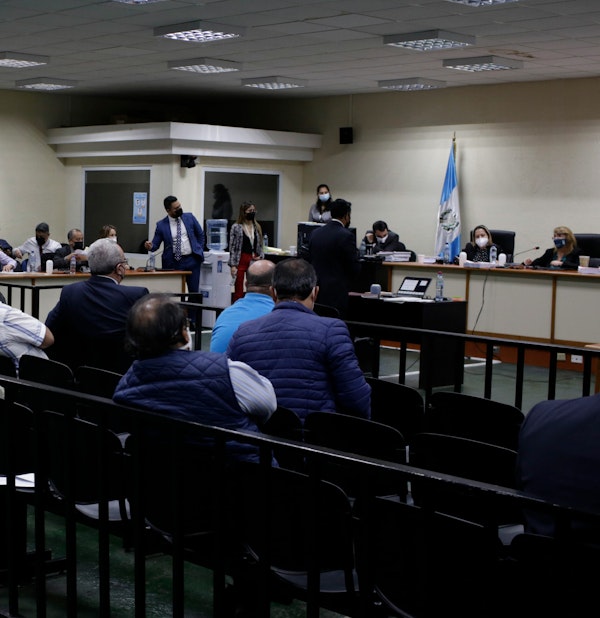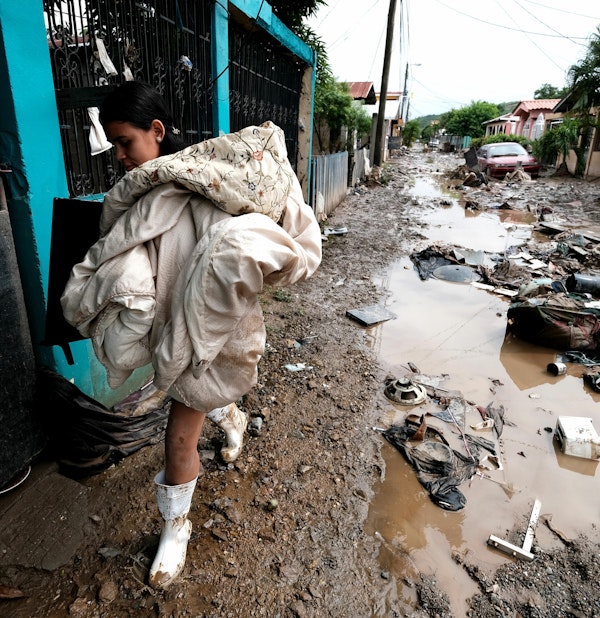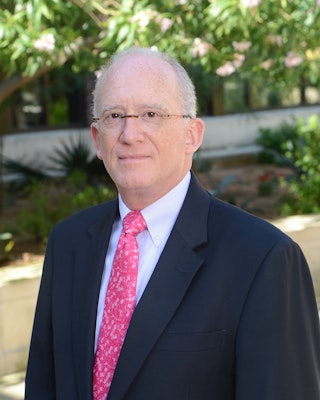How American Diplomacy Can Help Resolve the Root Cause of Migration From Central America
Leaders in the Northern Triangle in Central America face the ultimate in lack of trust: They have lost credibility with their citizens. The United States, by virtue of geography and trade agreements, has to make careful diplomatic decisions if it is to help those countries regain trust.
 Former President of Guatemala Perez Molina's and other public servants stand trial for corruption on January 19, 2022 in Guatemala City, Guatemala. (Photo by Josue Decavele/Getty Images)
Former President of Guatemala Perez Molina's and other public servants stand trial for corruption on January 19, 2022 in Guatemala City, Guatemala. (Photo by Josue Decavele/Getty Images)
When the Bush Institute began to develop our Central America Prosperity Project in mid-2018, we invited a group of thought leaders from across the three countries of the so-called Northern Triangle to help us understand why those economies don’t produce more job opportunities.
They offered the expected responses: lack of investment, poor infrastructure, an inadequately trained and educated workforce, a weak public health infrastructure. Many also pointed to widespread violent crime driven by narcotics trafficking, an outmanned and outgunned police force, and a crumbling justice system.
All of these answers are correct, of course, as far as they go. But why doesn’t investment flow? Why are the infrastructure, education, and health systems so poor? Why are the police and the courts unable to enforce the law?
Ultimately, everyone agreed that the underlying problem at the root of all those societies’ ills is corruption.
When Central Americans talk about corruption, they of course mean the beat cop who takes money in exchange for overlooking a minor traffic offense. They mean the bureaucrat who takes the price of a cup of coffee for putting your file on top of the stack. And they mean the politician who takes a percentage off the top of a public contract to build a road or provide web hosting services.
But if you probe for the underlying answer, what they mean is more fundamental than people lining their pockets at the expense of the public, as bad as that is. They are talking about institutions and leaders that have so completely lost credibility with the public that they are unable to function.
They are talking about institutions and leaders that have so completely lost credibility with the public that they are unable to function.
Of course, these institutions function in the narrow sense that they collect revenues, employ staff, make policy decisions, issue regulations, and pass legislation. But all of these “official” acts are undermined by the knowledge that their true agenda is different: Leaders are talking about the public interest while serving their own interests.
In effect, these institutions — and those of far too many countries across Latin America and the world — have become extractive instead of inclusive, to adopt the framework proposed by Daron Acemoglu and James A. Robinson in their 2012 book, Why Nations Fail: The Origins of Power, Prosperity, and Poverty. As they write:
“Inclusive economic institutions that enforce property rights, create a level playing field, and encourage investments in new technologies and skills are more conducive to economic growth than extractive institutions that … fail to protect property rights or provide incentives for economic activity.”
Acemoglu and Robinson go on to note that “…extractive economic institutions are synergistically linked to extractive political institutions, which concentrate power in the hands of a few, who will then have incentives to maintain and develop extractive economic institutions for their benefit and use the resources they obtain to cement their hold on political power.”
How do countries put an end to this vicious cycle? Acemoglu and Robinson are less helpful here, noting only historical examples where a crisis laid bare the corruption for all to see, and a broad-based movement — whether a political party or civil society organization — arose to seize the moment and show the way to a more inclusive future.
There has been no shortage of crises in Central America: hurricanes, earthquakes, civil conflict, mass emigration, the pandemic, to name just a few. But the one time that political leadership did seize the initiative – in the immediate aftermath of the region’s civil conflicts, thirty years ago – it couldn’t quite deliver sustained hope of prosperity before its efforts, too, devolved into corruption and decay.
 A woman walks down the mud-covered street with debris caused by Hurricane Iota on November 21, 2020 in San Pedro Sula, Honduras. (Photo by Yoseph Amaya/Getty Images)
A woman walks down the mud-covered street with debris caused by Hurricane Iota on November 21, 2020 in San Pedro Sula, Honduras. (Photo by Yoseph Amaya/Getty Images)
One factor that sets Central America apart from other regions or countries that have found themselves in this kind of dead end is the towering importance of the United States in its social, political, and economic life. We are their major trading partner and source of foreign investment; millions of Central Americans have found a home in the United States; we are the cornerstone of their national security; all Central American leaders, for better or worse, must navigate with the U.S. as their north star.
One factor that sets Central America apart from other regions or countries that have found themselves in this kind of dead end is the towering importance of the United States in its social, political, and economic life.
As a result, even if we agree with Acemoglu and Robinson that the solution to Central America’s core challenge can only emerge from Central Americans’ own efforts, it is hard to see how they can succeed without support from the United States. American diplomacy cannot create the movement that will ultimately seize the opportunity presented by a crisis to lead those societies out of their extractive dead end. But it can acknowledge and encourage that movement when it appears and help create the permissive regional and international environment it will need to succeed.
COVID-19 has certainly laid bare the myriad distortions of political and economic life in Central America. Where is the broad political movement that can credibly lead those countries to a more inclusive future? Is it President-elect Xiomara Castro in Honduras? Is it the robust ecosystem of market-oriented think tanks in El Salvador and across the region? Is it the ferment of nascent political movements headed by globally minded millennials in Guatemala?
Any of these could turn the tide against Central America’s endemic corruption, just as they could, as past popular leaders have, devolve into custodians of the status quo. The difference could well lie with nimble American diplomacy that avoids one-size-fits-all approaches, identifies a winner early, and offers discreet political support.
As the U.S. government struggles to address the “root causes” of out-migration from Central America, is this the diplomacy we have?
Our Central American working group told us that the underlying cause of lack of economic opportunity is a policy environment that makes doing business difficult and risky and actually drives investment away.
With this in mind, the test American diplomacy should apply in choosing who to support should not be ideological or even, as distasteful as it might sound, implication in corruption. American support should go to leaders and movements credibly committed to economic policy reform, and our political commitment to them should last only as long as their commitment to reform.
American support should go to leaders and movements credibly committed to economic policy reform, and our political commitment to them should last only as long as their commitment to reform.
At the end of the day, Central America is joined to the United States by geography, a permanent trade agreement, and millions of American voters and taxpayers of Central American origin. We can play an important role in those countries’ future, if we focus on our interests there rather than the so-called imperatives of our domestic political debates.
The Catalyst believes that ideas matter. We aim to stimulate debate on the most important issues of the day, featuring a range of arguments that are constructive, high-minded, and share our core values of freedom, opportunity, accountability, and compassion. To that end, we seek out ideas that may challenge us, and the authors’ views presented here are their own; The Catalyst does not endorse any particular policy, politician, or party.

